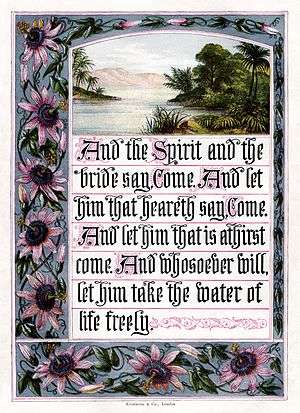Conditional election
|
|
| Conditional election |
| Unlimited atonement |
| Total depravity |
| Prevenient grace |
| Conditional preservation |
|
|
| Part of a series on |
| Arminianism |
|---|
 |
| Background |
| People |
| Doctrine |
|
|
In Christian theology, conditional election is the belief that God chooses for eternal salvation those whom he foresees will have faith in Christ. This belief emphasizes the importance of a person's free will. The counter-view is known as unconditional election, and is the belief that God chooses whomever he will, based solely on his purposes and apart from an individual's free will. It has long been an issue in Calvinist–Arminian debate.
Arminian doctrine
The doctrine of conditional election is most often associated with the Arminian churches. The Arminians have defended their belief against the doctrine of other Calvinist churches since the early 17th century when they submitted the following statement of doctrine to the Reformed Churches of the Low Countries:[1]
- That God, by an eternal, unchangeable purpose in Jesus Christ His Son, before the foundation of the world, hath determined, out of a fallen, sinful race of men, to save in Christ, for Christ's sake, and through Christ, those who, through the grace of the Holy Spirit, shall believe on this his Son Jesus, and shall persevere in this faith and obedience of faith, through this grace, even to the end; and, on the other hand, to leave the incorrigible and unbelieving in sin and under wrath, and to condemn them as alienate from Christ, according to the word of the gospel in John 3:36: "He that believeth on the Son hath everlasting life: and he that believeth not the Son shall not see life; but the wrath of God abideth on him," and according to other passages of Scripture also.
In relation to Scripture
The doctrine of conditional election derives from the view that Jesus's death on the cross was for all humanity, not just the elect (a Calvinist view called limited atonement). Arminians and others who oppose unconditional election take it to be impossible for God to elect particular individuals, and then declare that the gospel is available to all, because of the question which then arises: does limited atonement offer a true call to salvation or is it only for the elect? Arminians charge that Calvinism does not account for the many Biblical verses that declare that the gospel is available to all humanity. Therefore they answer with conditional election: God looked from eternity and foresaw who called on Jesus to be saved, and these people are those to whom He is referring, when speaking of the elect. In other words, when the Gospel is preached, every person has a real opportunity to believe, repent and receive forgiveness, not just the elect. Often Arminians point to verses such as Romans 8:29, saying that the verse means God predestined to save and sanctify everyone who He already knew would believe in Christ. Calvinists counter by saying that foreknowledge is not passive, but an active decision to "know" in a relational sense the elect, pointing out many.
Another form of conditional election is known as corporate election. Corporate election refers to Christian salvation being based upon "God choosing in Christ a people whom he destines to be holy and blameless in his sight." Donald C. Stamps in his Life in the Spirit Study Bible says, "Most simply, corporate election refers to the choice of a group, which entails the choice of its individual members by virtue of their membership in the group. Thus, individuals are not elected as individuals directly, but secondarily as members of the elect group." Although corporate election is a form of conditional election, it differs from the classic "foreseen faith" individualistic view of Arminianism.
Biblical support

All quotes from the NKJV unless otherwise noted, emphasis added:
Scriptures used to support
These are Scriptures commonly used in support of Conditional election:
- Isaiah 45:22 "Turn to Me and be saved, all the ends of the earth, for I am God, and there is no other."
- Mathew 11:28 Jesus said "Come to me, all who are weary and heavy-laden, and I will give you rest."
- John 3:16 "For God so loved the world that He gave His only begotten Son, that whoever believes in Him should not perish, but have everlasting life."
- John 7:17 "If any man is willing to do His will, he shall know of the teaching, whether it is of God, or whether I speak from Myself."
- John 7:37 "Now on the last day of the great feast, Jesus stood and cried out, saying "If any man is thirsty, let him come to Me and drink."
- John 12:32 Jesus said "And if I be lifted up from the earth, will draw all men unto Myself
- Romans 8:29-30 [NIV] "For those God foreknew he also predestined to be conformed to the likeness of his Son [...] And those he predestined, he also called; those he called, he also justified; those he justified, he also glorified."
- Acts 17:30 "Therefore having overlooked the times of ignorance, God is now commanding all men everywhere to repent."
- 1 Timothy 2:3-4 "For this is good and acceptable in the sight of God our Saviour; Who will have all men to be saved and to come unto the knowledge of the truth."
- 2 Peter 3:9 " The Lord is not slack concerning His promise, as some count slackness, but is longsuffering toward us, not willing that any should perish but that all should come to repentance."
- Revelation 22:17 The Spirit and the Bride say, "Come." And let the one who hears say, "Come." And let the one who is thirsty come; let the one who desires take the water of life without price.
See also
- Unconditional election
- Arminianism
- Calvinism
- Moderate Calvinism
- Corporate election, an alternative Arminian view
- Predestination